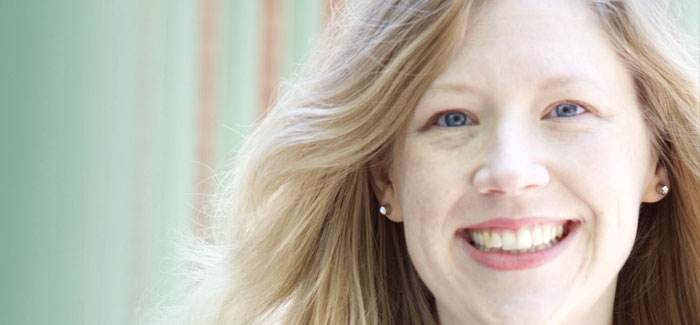
(Photography by Elizabeth McQuern)
Dana Norris, AM’03, explains what makes Story Club Chicago’s premier open mic.
Dana Norris, the host and founder of Story Club, a monthly reading series focusing on a new theme each show, discusses live lit in Chicago.
What does Story Club add to the Chicago live literature circuit?
Story Club is the only show that has both an open mic and curated performances. The audience gets to experience both the excitement of watching new performers step up to a mic for the first time and the pleasure of watching polished storytelling from our featured performers.
What’s one theme that surprised you with the creativity or honesty it elicited? What’s one you expected a lot from that turned out to be a dud?
The theme “waiting” had amazing stories. We had a journalistic account of a man on death row, a woman remembering her experiences as a child in the Philippines during World War II, and a woman coming to terms with the end of her husband’s prolonged illness. We haven’t had any dud themes, but mostly because the open mic-er aren’t required to adhere to the theme and I keep the themes quite general. If I had more specific themes, like “Easter lunch” or “Wednesday at the office,” we could run the risk of having an off show. I pick themes that I hope will inspire those who aren’t sure what type of story to tell to write something new.
What are some necessary ingredients for producing a successful reading?
People with stories to tell, people who want to hear stories, and a room. It’s a really simple recipe, and it’s why there are more than 52 monthly storytelling shows in Chicago. Outside of these basics, I like a venue that’s quiet enough that everyone can hear the storyteller without being interrupted by the whir of an espresso machine. I also like a venue that serves food because it helps to build the storytelling community when the audience is able to break bread together.
What goes down at the South Side Story Club? How did that come to exist?
Story Club South Side started last fall. This show is held in Bridgeport, and I started it because I had noticed that, at the time, almost all storytelling events were on the North Side. I have a friend, Will Hindmarch, who’s active in the Bridgeport community and was interested in producing a second Story Club show. We found a great host in Andrew Marikis, acquired a venue at the Co-Prosperity Sphere [a gallery space], and Story Club South Side was born. Will and Andy are starting a new series of Story Club South Side shows on May 21. They’re experimenting with the form of storytelling. If you have a piece that’s a little off the wall, Story Club South Side is a great place to perform.
What are your tips for delivering a strong first-time performance? How important is eye contact? What about memorizing the story ahead of time?
My number one tip for first-time performers is to not be afraid of the microphone. Your natural urge is to stand away from it, not get too close, but in order for the audience to really hear you, you need to put your mouth right against it. It’s a piece of advice that I was once given by Ellen LeKostaj, a producer of The Moth: “Eat the mic.”
I also encourage people to rehearse ahead of time so their reading goes smoothly and they don’t hiccup over their words. Don’t preamble your piece when you get up there—don’t introduce it and especially don’t apologize for what you’re about to do. You’re not doing anything wrong, you have every right to be there, and people want to hear what you have to say. Pretend as though you’re relaxed and comfortable on that stage, and the audience will believe that you are.
It’s important to look at the audience while you’re performing, but you don’t need to make eye contact, which can sometimes be intense and throw you off. I always look at people’s foreheads, and they think that I’m looking at them in the eye. I think that stories told without paper are effective—the audience loves the immediacy, and the performances becomes conversational.
What writing did you do while you were at UChicago? Does any of it get performed live today?
I wrote mostly academic papers. My thesis was on a comparison of conceptions of suffering in the plays Job and Rosencrantz and Guildenstern Are Dead. I majored in both religion and creative writing, but when I came to UChicago for my master’s in religious studies, I abandoned creative writing. After I received my degree and was searching for a job, I wrote a story about an unfortunate interview I had to become a Mary Kay lady, and it showed me that the spark was still there. I realized I could explore the questions that had interested me while I was at UChicago—Why do people suffer? Does suffering impart meaning?—from a creative perspective. I’m now pursuing my MFA in creative nonfiction from Northwestern and exploring those same themes in my thesis. I’m a double major for life.
